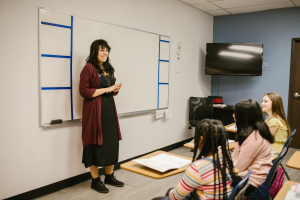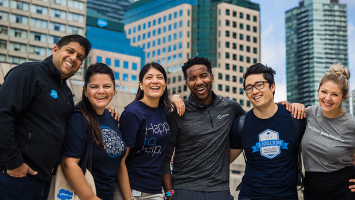Top 15 Most Asked Banana Republic Interview Questions with Answers
Here are the top ten most asked Banana Republic interview questions with answers, as well as suggested answers to help you prepare for your interview. As with ... read more...many retail positions, there may be multiple rounds of interviews, so prepare for questions like these when preparing for your interview.
-
This is one of the first questions you'll be asked by almost every company you interview with. This does not have to be a lengthy response, but it should be honest and direct. If you frequently buy this brand, this job could be an excellent opportunity to learn more about it. However, if you are only looking for a seasonal job, you could also respond in this manner. For this question, you need to say you love the product and the service you get, and because of this, you would be happy to represent them. Say you love fashion and love helping others look fashionable. Mention that you have great communication skills, which will allow you to excel in this role in regard to working with customers.
Employers want to know you care about what they do, whether it's a product, a service, a mission, or a brand. You can also relate your passion to the company's core values, which are frequently listed on its website. Demonstrating your enthusiasm for the position is especially important if you're applying for a position at a nonprofit whose mission aligns with your personal values.
Answer: I've previously worked for several retail stores and am looking for my next opportunity. I've always wanted to work for a high-end clothing retailer, and I adore the styles available at Banana Republic. Working at the store where I shop seems like the ideal job for me.
Image by Van Tay Media via unsplash.com 
Image by Christina @ wocintechchat.com via unsplash.com -
Some employees may appear unmotivated at work, necessitating extra attention from managers in their already hectic schedules. If an interviewer asks this question, it's because they want to know if you'll be motivated and dedicated enough to work well without constant supervision or if you're the right fit for a hectic clothing sales position. What truly motivates us at work and what people should discuss in an interview are typically two distinct topics. Most of us work for a living. People require money to live and support their families. To be honest, very few people would go to work if they weren't paid to spend 8 or more hours a day somewhere.
However, as you might expect, money is not the best answer to the interview question about your workplace motivation. However, the exception proves the rule. Let's look at seven good responses to this question. After you've checked the answers, don't forget to read the notes below them. They will assist you in understanding how to persuade your interviewers.Answer: I enjoy providing outstanding customer service. If I can make someone's day better by assisting them in obtaining what they require, that's a good day in my book. I am also a team player who is always willing to go above and beyond to ensure that my team achieves their objectives.

Image by KOBU Agency via unsplash.com 
Image by Christina @ wocintechchat.com via unsplash.com -
Companies frequently require their employees to work in groups. "How do you feel about working in a team environment?" is a common interview question that you should expect when you go for a job interview. This question is intended to assess how well you work as part of a team, collaborate with others, and contribute to the success of a team.
In the retail industry, collaboration is essential. Managers need to know that they can depend on you not only to complete your work but also to ensure that the entire store runs smoothly, even if a section or task is outside of your normal responsibilities. If you or a teammate are stuck with a single customer for an extended period of time, you may be asked to fill in for them in the meantime. This question allows the interviewer to see how you will act in this type of situation.
Answer: The good of the team is very important to me, and I'm always willing to assist a coworker. I believe that supporting your team is essential to the group's success. For example, if someone needed additional assistance stocking their section, or if I needed to cover a register while they manned the fitting rooms, I would do so if I wasn't currently engaged with a customer and had the time and ability to do so.

Image by Jason Goodman via unsplash.com 
Image by Jason Goodman via unsplash.com -
The way you communicate with customers has a significant impact on your brand, and nothing provides more customer satisfaction than consistently delightful communication. When you're thinking about how you communicate information to (and receive feedback from!) customers, you'll get better results than any flashy new logo or 20% off coupon could. But what exactly does "thoughtful" communication entail when speaking with a customer? What is the strategy behind effective conversations? Treating people like humans is the first step toward providing world-class customer service.
Working in a clothing store may require you to provide fashion advice on occasion. This is a unique position in comparison to others, where you will most likely need to have an eye for design and styling. This is a critical question to answer because you cannot simply impose your personal style on someone else if they do not like it. You must be adaptable, find out what the customer wants, and work with them to find the right fit, color, and cut. You may need to elaborate on this answer, but it is nothing to be concerned about.
Answer: I believe I have a good eye for fashion design. I know what I like, but I also know what pieces would complement each other. If a customer came in looking to change their look or find the perfect accessories to complete their outfit, I would direct them to the appropriate section and explain the various options we have in stock. I would also try to remember current sales in order to promote the products we want to move, but ultimately it would be up to the customer and what they wanted.
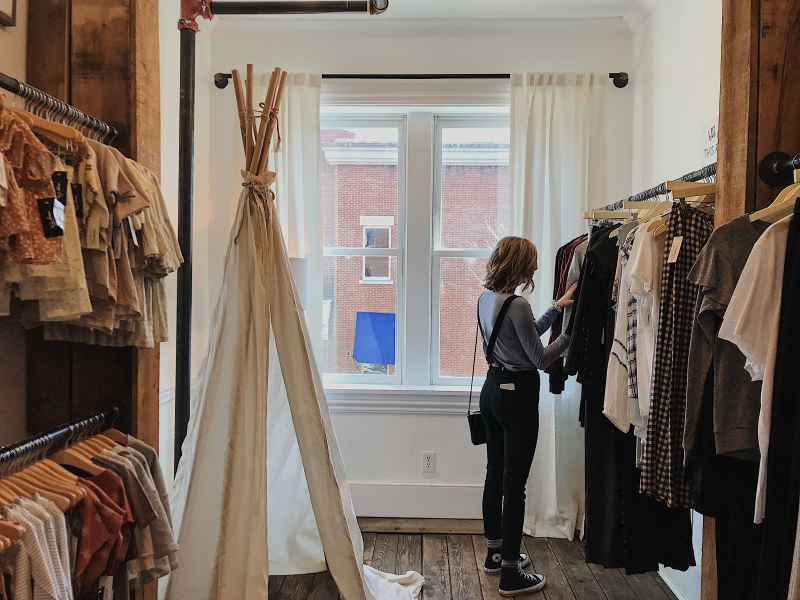
Image by Cam Morin via unsplash.com 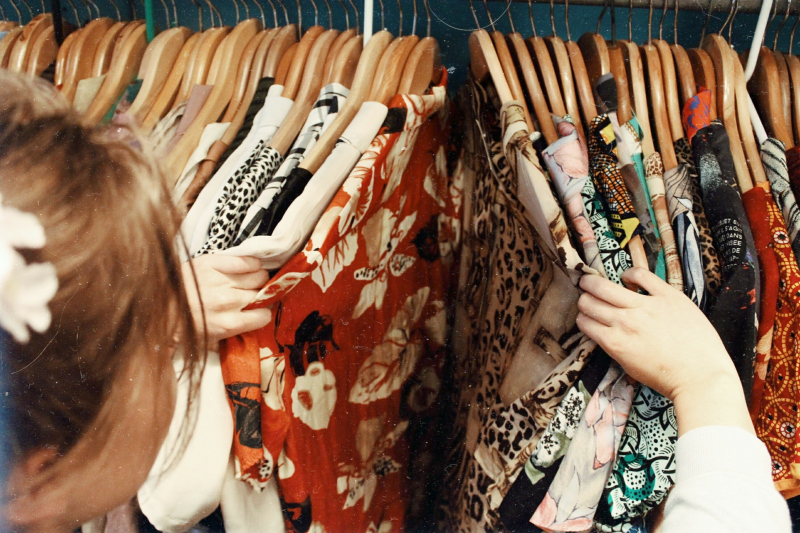
Image by Becca McHaffie via unsplash.com -
It's a good idea to review your professional experience from the application process so you know what expectations you've set for the interviewer. Examine the most relevant experiences on your resume, cover letter, and formal application, focusing on their responsibilities, skills, and accomplishments. Use the job listing terminology to phrase your experiences in terms that the interviewer will understand.
This is another fairly common question, and you should be prepared to answer it. Remember that the interviewer has probably already read your resume before you arrive, so there's no need to simply read off a list of all the places you've worked. Simply give the highlights and list your major achievements. If you have a diverse work history, you can talk about the positions that are most closely related to this one. This is another chance to get a job at Banana Republic. Keep in mind that the interviewer has read your resume and learned about your work experience, so you should give a simple and brief answer, discussing your experiences that are closely related to the position you have applied for at Banana Republic. This is the most important question, and you should be prepared for it.
Answer: I've previously held several retail positions with other department and clothing stores. I worked at Old Navy for two summers during high school, then at H&M for two years during college as a sales clerk and eventually as a shift manager.

Image by Headway via unsplash.com 
Image by Firmbee.com via unsplash.com -
Employers learn about applicants' skills, training, and experience through interview questions. Effective questions also demonstrate candidates' thought processes by having them describe how they solve problems and address issues that arise on the job. Interviewers may, for example, inquire about how you made a positive impact in the workplace in a previous position. They want to know if you can take initiative and improve the workplace. They may be looking for creative, motivated employees who can boost the morale and productivity of the organization.
Clothing and retail are all about making money. You may not be paid on commission, but the success of the store is your success. If you have previous work experience in this type of setting, you should be prepared to discuss how you contributed to the store's or team's success (without bragging too much). Discuss how you were directly involved in increasing sales.
Answer: When I was working at American Eagle, our store was one of the busiest in the area. Our holiday sales figures were always above average, which demonstrated how well our team collaborated. When I worked a shift, I tried to check out every customer quickly and cheerfully, offering add-ons and upsells when appropriate and also enrolling people in the rewards programs. If I wasn't at the register, I tried to keep every shelf and display organized and fully stocked so customers could find what they were looking for.
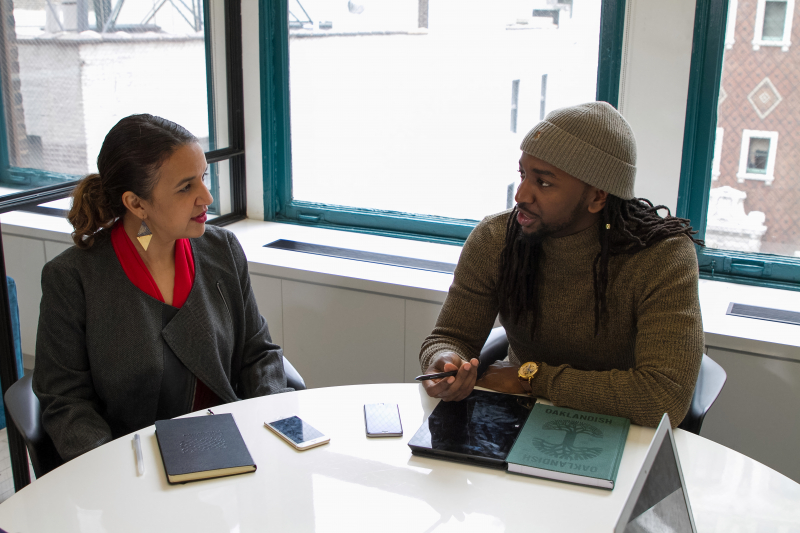
Image by The Jopwell Collection via unspalsh.com 
Image by The Jopwell Collection via unsplash.com -
Banana Republic stores are typically open seven days a week, from 10 a.m. to 7 p.m. Workers typically rotate between short and long weeks, which means that one week you'll work Monday, Tuesday, Friday, Saturday, and Sunday, and the next week you'll only work Wednesday and Thursday. When applying for a retail job, the interviewer will want to know how flexible your schedule is. If you are unable to work during certain times of the year, be upfront about it now to avoid problems or confusion later. However, if you can open up your availability in any way, you will appear to be a better fit for the team. That means you'll have to work two weekends a month. Assure the interviewers that you have carefully read the job description and understand what they will expect from you in the job.
This is also an opportunity to demonstrate your collegiality. Nobody wants to work on a Sunday. But you understand that when you work on weekends, your coworkers may be at home with their families or friends. And the following weekend, they will return the favor... The question may be phrased differently at times, such as "What is your availability?" but the principles remain the same.Answer: I am available for most shifts, including those in the evenings and on weekends. I am still enrolled in a couple of college courses, so I may need to request time off around finals week, but I am also more readily available during the summers and between semesters.

Image by Dylan Gillis via unspalsh.com 
Image by CoWomen via unsplash.com -
Quality customer service is not an advantage. It's a requirement in today's competitive market. Assure the hiring managers that you will consider their feedback. You will patiently listen to the customer and try to figure out what went wrong, what they misunderstood, and why they are upset.
Then you'll try to make things right. You will also try to learn from the experience so that you do not make the same mistake again. Of course, during peak times, it is impossible to provide excellent service to every customer. Customers simply have to wait for their turn when there are many people in the store and only a couple of sales associates. And some of them may be dissatisfied and complain. In such a case, the only thing you can do is apologize, possibly give them a gift card (if permitted), and continue to do your best with other customers.
Answer: If a customer was dissatisfied with their purchase or couldn't find what they were looking for, I would try to remain pleasant and helpful while answering their questions or providing an alternative if we were out of stock. If they continued to complain, I would bring my manager in and explain the situation to the best of my ability, always attempting to advocate on behalf of the customer.

Image by Christina @ wocintechchat.com via unsplash.com 
Image by CoWomen via unsplash.com -
This is a condensed version of the standard interview question, "Where do you see yourself in five years?" Instead, the interviewer may ask, "Where do you see yourself in the next year?" Interviewing, hiring, and onboarding new employees is an expensive and time-consuming process for any business. The interviewer wants to know that if you're interested, you'll see this as a long-term fit. Discuss your career plans and goals, as well as how they align with what this company has to offer. Describe your enthusiasm for this opportunity as well as your impressions of the company for which you are applying.
Employee turnover is high at Banana Republic, as it is in most other retail stores that sell clothing, shoes, and accessories. Sales associates typically earn $8–13 per hour, which isn't a bad wage considering how demanding the job can be. This is why so many people leave. However, when interviewing for a job, you should try to persuade them that you intend to stay for a long time and possibly even grow with the company. Tell them you see yourself working as a sales associate (customer service assistant) in a year, achieving great results, and possibly considering a promotion if a managerial position becomes available in the store. Of course, you are not required to be with them for a year, a month, or a week. You are free to leave whenever you want. When interviewing for a job, you should try to persuade them that you are serious and do not see this as a temporary solution.
Answer: I have 3 years of experience as an assistant manager in ANN, Inc., and currently I am joining as an assistant manager. I have the abilities to manage all departments connected to our store and have deep knowledge about fashion stores. At Banana Republic, I see myself as shift manager in the next 3 years.

Image by Maranda Vandergriff via unsplash.com 
Image by LinkedIn Sales Solutions via unsplash.com -
A heavy workload occurs when the number of responsibilities one has exceeds what can realistically be done in a given role. It can be the result of a company attempting to cut costs, but it can also be the result of how work is delegated to or managed by the individual. Recognizing a heavy workload is an important first step toward achieving balance and your career goals. The factors that determine when a workload becomes too heavy are subjective, but if the quality of your work suffers or your personal life or health suffers as a result of your job, your workload may be too heavy.
Consider whether your responsibilities are short-term, long-term, or a combination of the two, and how they may affect other priorities in your life and your personal well-being. At Banana Republic, or any clothing store, you will most likely do something different every hour of the day. Your manager will want to know that you can stay on task and complete tasks, making you a valuable team member.Answer: I try to complete my primary responsibilities as soon as possible (such as putting inventory on the racks or organizing a display), but I am willing to be flexible if customers need to ask me a question. I am always happy to direct people to the appropriate section based on their selections, and I am also aware that things will most likely change very quickly based on how things sell throughout the day.

Image by Van Tay Media via unsplash.com 
Image by Gabrielle Henderson via unsplash.com -
Running late to work happens, but it's important to notify your boss if you won't be arriving at your scheduled time. As soon as you are able, notify your workplace that you will be late. This will allow them to accurately plan for the time you are not in the office. Even if you believe there is a slim chance you will be late, contact your manager anyway so they can plan for your potential tardiness. In either case, notify your manager of your expected arrival time.
For example, if you have an early morning doctor's appointment that should allow you to arrive at the office before your scheduled start time, you should notify your manager that if the doctor is running late, you will be affected and will most likely be late as well.
Answer: I understand the significance of punctuality and why everyone in the workplace should stick to the deadlines and timelines that have been established. However, some circumstances, such as traffic or a sick partner, may be unavoidable. As a result, whenever I suspect I will be late, I call in and ask a colleague to cover my shift. In my previous workplaces, we always did the same for one another, and I expect the same here. However, I am not always late for work on a daily basis.

Image by CoWomen via unsplash.com 
Image by CoWomen via unsplash.com -
Employers may ask you what you would do if you witnessed an employee stealing in order to determine whether you are comfortable reporting a situation to your superiors. This can also be used to assess your loyalty to the company and your willingness to follow their policies, even if it means reporting one of your coworkers.
Your response can inform the employer about your ethics and moral values, allowing them to determine whether they align with those of the company. Some businesses may have a zero-tolerance policy for theft, so your response can help them determine whether you would fit in with their culture. When answering this interview question, make sure to respond as soon as possible. This demonstrates to the employer your decisiveness and ability to react quickly in the heat of the moment. Employers want someone who can take corrective action quickly when problems arise. A prompt response also demonstrates that you have already formed an opinion about whether stealing is wrong, which is important for companies that strongly discourage it.
Answer: I do not support corporate thievery, even if it means being labeled a sell out. I believe that anything that affects an establishment's profitability has a negative impact on its workforce, which I am not prepared for. As a result, in such cases, I would either blow the whistle and report the theft or deal with it in accordance with the store's policies. Overall, I will make certain that action is taken to prevent an influx of such cases.

Image by LinkedIn Sales Solutions via unsplash.com 
Image by LinkedIn Sales Solutions via unsplash.com -
Hiring managers use behavioral interview questions such as "tell me about a time when you failed" to determine your personality and look for red flags. You must demonstrate how you dealt with a difficult situation, how you turned it into a learning experience, and how you avoided making the same mistake twice. The interviewer is also trying to determine whether you are being truthful about a genuine failure with a previous employer. When answering this tricky question, use the STAR format to organize your ideas into a story that will leave a good impression on your potential employer. The acronym STAR stands for:
- S: Situation - describe how long ago it was, where you worked, and so on.
- T: Task - explain what you were supposed to do.
- A: Assignment - Tell them what happened, what went wrong, and how you handled it.
- R: Result - demonstrate a positive outcome: what you learned, how you fixed the mistake, and how you will not make the same mistake again.
Answer: I once had a verbal spat with a customer, which I would prefer not to repeat. I wasn't having a good day, and he kept pulling my leg and insulting me verbally. I lost my cool and insulted him back, which surprised the other employees, especially the supervisor. I was later summoned from the counter and chastised. I explained that I was having a bad day and that the customer was pushing me despite the fact that I had been polite to him throughout. Fortunately, my boss understood and gave me the rest of the day off. This experience, however, taught me the importance of developing patience and tolerance in the workplace, which I have always supported.

Image by Windows via unsplash.com 
Image by Jessica Da Rosa via unsplash.com -
A hiring manager will ask you several questions during a job interview, including questions about previous workplace challenges you've faced. An effective response to this common interview question will emphasize your problem-solving abilities and professionalism. Preparing your response in advance will give you more confidence during the interview and a better chance of impressing the hiring manager.
Employers want to know what struggles you've faced in previous jobs and how you overcame them when they ask, "What's the biggest challenge you've faced at work?" They want to assess your problem-solving skills in your response, which can give them an idea of how you'd deal with similar challenges in the role you're interviewing for. Consider any instances that presented a struggle that you were able to solve or overcome to identify challenges you've faced in previous positions.
Answer: Given my passion for fashion and accessories, I've always wanted to work at Banana Republic. However, I am aware that despite the joy and fulfillment I will experience, I will face some difficulties. This is a very busy establishment with many orders and buyers every day, which means I will have to work twice as hard, which I am prepared for.
Image by Brooke Cagle via unsplash.com 
Image by Kenan Buhic via unsplash.com -
So you've gotten your foot in the door at your dream company. You've sent in the perfect resume and made a strong first impression during the phone interview. All that remains is to impress the hiring manager during the face-to-face interview. As a well-informed candidate, you're researching the company and preparing responses to the most important interview questions you can think of, the most notorious of which is "What is your greatest weakness?"
You don't want to say things like, "I work too hard" or "I am a perfectionist." That can easily come across as scripted and insincere at best, and self-aware at worst. When asked, "What is your greatest weakness?" interviewers want to know how honest and self-aware you are. They will also look for evidence that you are motivated to improve your weaknesses. The best responses to this question honestly explain a flaw and provide an example of how you are actively working to improve.Answer: I've discovered that I'm a workaholic over the years. When dividing work, I usually take the largest chunk, which hurts me because I have to work overtime. It also implies that I have previously struggled with a life-work balance, which I am currently working on. Overall, I am pleased that I am progressing.

Image by LinkedIn Sales Solutions via unsplash.com 
Image by LinkedIn Sales Solutions via unsplash.com


















